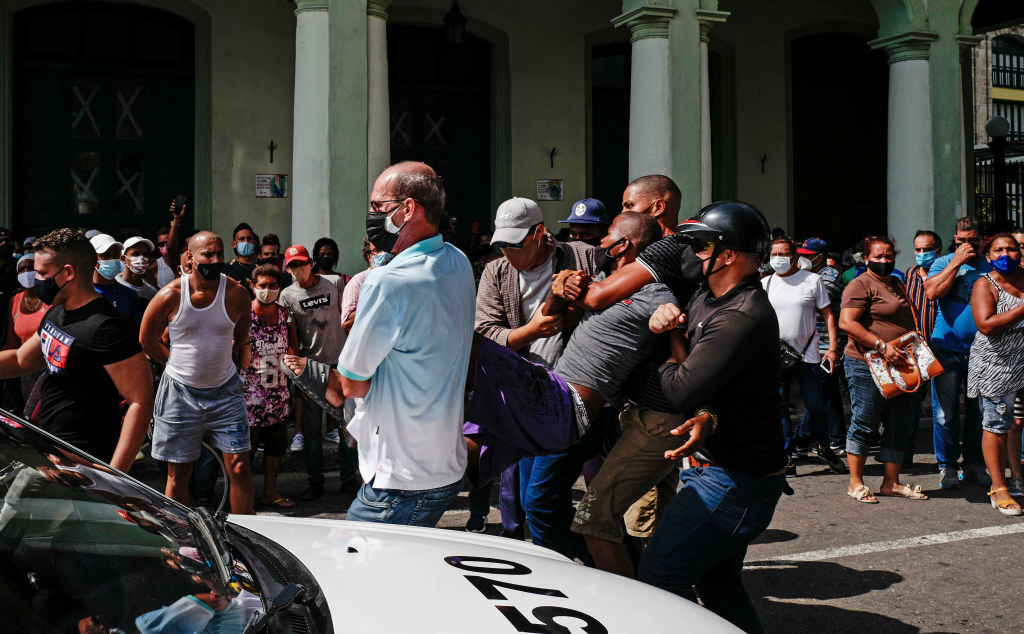The Cuban People Deserve Freedom: Where Is the US Help?
by Guy Millière • July 25, 2021 at 5:00 am
All available data...show that before Castro took power, Cuba was far from being in a disastrous situation. In 1958, the Cuban income per capita was double that of Spain and Japan. Cuba had more doctors and dentists per capita than Britain. Cuba was second per capita in Latin America in ownership of automobiles and telephones, and first in the number of television sets per inhabitant. Cubans could enter and leave the country freely. Fulgencio Battista was a dictator, but Battista's dictatorship was so "fierce" that Fidel Castro, arrested in 1953 and sentenced to 15 years in prison for a failed coup d'état was pardoned and released by Battista in 1954. Under his own dictatorship, Castro would not have been so lucky.
The Cuban economy was rapidly destroyed. All businesses, until recently, have been state-owned. Wages in Cuba are abysmal; the population is effectively destitute. The average monthly salary in 2015 was $18.66. Persecution, imprisonment and torture of anyone who dares to criticize the regime are routine. Hundreds of thousands of Cubans have passed through Cuba's reeducation camps since 1959. More than 15,000 Cubans have been executed by firing squad. The health system is good for members of the regime and for medical tourists who pay in American dollars, but in a sordid state for ordinary Cubans.
The Cuban government under Battista was corrupt, but it is difficult to believe that the dignitaries of the Castro regime did not enrich themselves. At the end of his life, Fidel Castro's fortune was valued at $900 million.
In "36 hours in Havana", a report in The New York Times on January 5, 2016, Cuba's capital city is described as full of "classic American cars and salsa singers" and as "an old city where the old and the modern are in contrast". The decay of many buildings, the immense poverty of the bulk of the population, the crushing weight of the communist dictatorship are completely left out.
US Secretary of Homeland Security Alejandro Mayorkas, himself a refugee from Castro's Cuba, immediately threatened his fellow Cubans: While everyone, including criminals who have previously been deported, may freely enter the United States through America's wide-open southern non-border, all Cubans and Haitians fleeing by sea will be returned to their squalor. "The time is never right to attempt migration by sea," he warned them on July 13. "... Allow me to be clear: If you take to the sea, you will not come to the United States."
On July 12, the Cuban regime cut the Cubans' access to the internet. The regime's police will therefore able to crush the uprising without one image coming out of Cuba.

Sunday July 11. Demonstrations erupt in the main cities of Cuba. Tens of thousands of people take to the streets. They know they risk being brutally arrested, sent to jail, possibly tortured and killed by the police. They reject the communist dictatorship that has oppressed them for 62 years. They shout "Libertad": freedom. They hold up Cuban and American flags -- once again, the symbol of people who yearn to breathe freely.
Those who dream of communism for the Western world first kept silent, then, while making a few criticisms of the dictatorship in Cuba, blamed it on an American embargo. They failed to point out that if the Cuban dictators cannot trade with the United States, they still can trade with the rest of the world; and also failed to point out that Cuba has nothing to sell: its leaders have destroyed the country's economy.
Governments in Western Europe have made no comment to date; they seem to prefer avoiding the subject.


